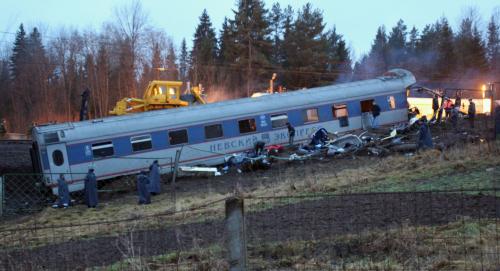|
Among the most active groups in India have been Lashkar-e-Taiba, Hizbul-Mujahedin and the United Liberation Front of Asom. These are all extreme leftist organizations, and have posed a major threat to the country.
Antiterrorism actions
Since U.S. President Obama took office in January, Washington has replaced its counterterrorism strategies with more pragmatic policies.
 |
|
OFF THE RAILS: A damaged railway carriage perches near a village in Russia's Novgorod region on November 28. A bomb attack on the upscale passenger train traveling between Moscow and Saint Petersburg the night before killed at least 39 people (XINHUA/AFP) |
From simply changing the very designation of the "Global War on Terror" to "Overseas Contingency Operation," the Obama administration has sent an enormous goodwill gesture to the Muslim world. In the eyes of many, it has been long overdue.
Militarily, the United States has at once isolated and struck at radical Taliban forces while drawing more moderate Taliban elements to its side.
Diplomatically, the United States has offered incentives for and pressures on countries like Pakistan and Afghanistan to intensify their antiterrorism efforts. At the same time, Washington has pushed its European and Japanese allies to share responsibilities and to contribute to the reconstruction of these countries and regions.
Overall, the United States has faced multiple challenges. First, the Taliban in Afghanistan has enhanced its strength. Second, the process of rebuilding Afghanistan has been fraught with difficulties. Controversies over the Afghanistan presidential elections have weakened the legitimacy of the newly elected administration, for one thing. The inadvertent result of this has been an increase in public support for Taliban.
The capability building up of the Afghan National Army and National Police in terms of equipment, preparation for war and handling of various security issues, on the other hand, has taken place very slowly.
Third, Pakistan can hardly make claims it has made any substantial progress fighting against terrorism. Since May, Pakistan has stepped up efforts in cracking down on the TTP, which has generated some positive results. But in general, it lacks the military and financial resources to vanquish the group once and for all.
Fourth, the U.S. administration is facing increasing anti-war sentiment at home. An August poll by The Washington Post and American Broadcasting Company, for instance, showed that more than half of the American public opposes sending more troops to Afghanistan.
Fifth, allied support has its limits. NATO forces are mostly stationed in the northern parts of Afghanistan and other places where the Taliban is relatively inactive. Lacking coordination, these forces have yet to join together in combating terrorism.
Focal points
With an upsurge in international terrorism and a sharper U.S. policy toward combating it, the contest between terrorism and international counter-terrorism forces has entered a new phase. The outcome will, to a great extent, define the future of world security.
Looking forward, there are three major points that will affect the trend of international counterterrorism efforts.
The first will be the United States' newly adjusted antiterrorism policy. On December 1, President Obama announced his new strategy against terrorism—dispatching 30,000 more troops to Afghanistan, thus enhancing Kabul's capabilities in security and law enforcement. This will also increasing aid in local construction, and attempt to add gains in support from allied countries to fight against Al Qaeda terrorist forces. But whether or not the United States will reach its targets remains constrained by many factors.
The second will be how far Pakistan can go in combating terrorism. Though the Pakistani authorities have made some progress in their military actions, local, political, economic, religious and nationality issues will add to the complexity of future situation.
The third will be how the chaos in the Middle East and North Africa evolves. The answer to this lies in the degree to which the environment of politics and extremism allow it to continue.
The author is an associate research fellow at the China Institutes of Contemporary International Relations | 